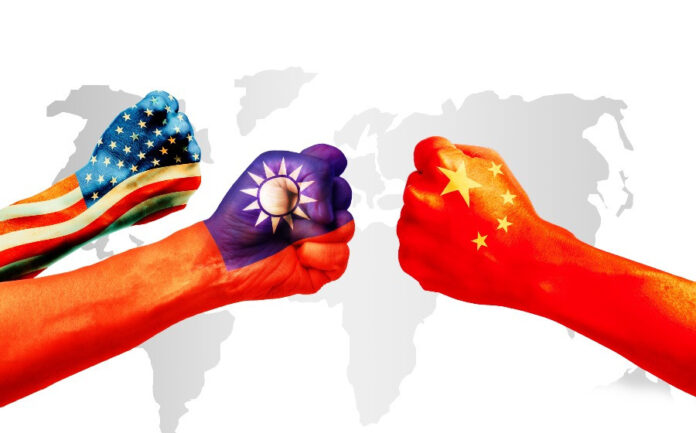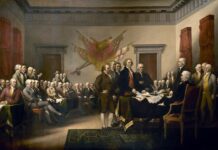In the past few weeks, China’s military, the People’s Liberation Army (PLA), vitriolically announced that it would “not sit by idly” and promised to fire upon escorting US fighters if necessary. Upon House Speaker Nancy Pelosi’s Taipei visit, dozens of Chinese fighter jets swiftly intruded Taiwan’s air defense zone. However, this military deployment was not the first to have created a tense situation for the superpowers.
THE HISTORY
From 1945 to 1949, Mao’s Communist forces clashed with the US-backed government – the Republic of China (Nationalists) – for four years. After numerous victories and campaigns that cost millions of lives, Mao Zedong and his Communist forces finally unified China and established the People’s Republic of China (PRC). As a result, Nationalist supporters and troops under Chiang Kai-shek withdrew to the minuscule island of Taiwan.
Over the next few decades, Taiwan-China Cross-Straits Relations gradually brewed up. These relations involved several brief conflicts and international interventions.
In 1954, The Sino-American Mutual Defense Treaty was signed and projected to be effective from 1955 to 1980. Specifically, this treaty obligated the United States to defend Taiwan from any Chinese assaults, except for the islands of Kinmen and Matsu off of mainland China’s southeast coast.

POST-CHINESE CIVIL WAR CRISES
In the first conflict, Chinese artillery bombarded Kinmen and Matsu in an attempt to deter Chiang Kai-shek from assaulting the mainland. The conflict lasted for seven months and resulted in the Chinese seizure of several islands. Also, the US military evacuated both its and Taiwan’s military personnel and civilians from Dachen Islands.
In the second conflict, the Chinese resumed shelling the islands in 1958. During this brief bombardment, the US military considered the use of nuclear weapons against China. However, President Dwight Eisenhower rejected the proposal. For several bitter months, China and Taiwan exchanged artillery fire, resulting in the deaths of over a thousand soldiers and civilians. The conflict ended at the end of 1958.
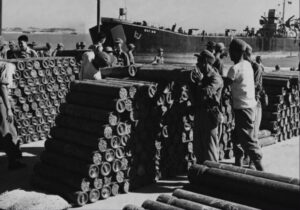
After several decades of uneasy peace, a third conflict erupted when Lee Teng-hui – Taiwan’s president – visited his alma mater, Cornell University in June 1995. After deliberate consideration, the Clinton administration allowed a Congressional resolution in support of the visit. As a result, China responded with months of military exercises. Beijing viewed Lee’s visit to the US as a betrayal of American commitment to the “one-China policy” and committed to deterring voters from Lee. Despite months of military threats, Lee won Taiwan’s presidential elections with 54% of the votes. In 1997, Chinese then-President Jiang Zimin made a diplomatic visit to the US. However, tensions between Washington and Beijing remained high until this day.
NEWT GINGRICH’S 1997 TRIP
In 1997, US then-Speaker of the House Newt Gingrich made a visit to several Asian countries. Gingrich wished to meet America’s obligation to the Taiwan Relations Act, including a commitment to assistance in the defense of Taiwan. Following his visits to China and Japan, Gingrich and a dozen Congressmen ventured to Taiwan. Initially, Chinese leaders objected to Gingrich’s Taiwan stop but eventually tolerated it because Gingrich threatened to skip Beijing. Upon arrival, Gingrich voiced his support for the one-China policy and hoped for Taiwan’s peaceful reunification with mainland China. However, Gingrich reaffirmed America’s unquestionable commitment to the aid and defense of Taiwan.
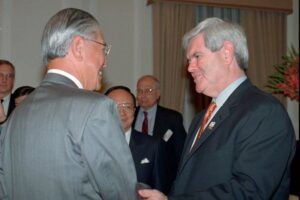
Overall, Newt Gingrich’s 1997 trip upheld the continuation of American acknowledgment of the one-China policy and necessary defense of Taiwan. From Gingrich’s trip to late July of 2022, the American “China-Taiwan strategy” has not altered. Not until Speaker of the House Nancy Pelosi’s trip.
GINGRICH-PELOSI CONNECTION
Recently, House Speaker Nancy Pelosi announced that she would embark on a diplomatic trip to Malaysia, Singapore, South Korea, Japan, and Taiwan. Pelosi was the highest-ranking American official to visit Taiwan since 1997. This action caused a widespread feeling of bitterness among Chinese officials. Also, some officials regretted allowing Gingrich to enter Taiwan. For instance, Chinese Foreign Ministry spokesman Zhao Lijian condemned Gingrich’s record on Taiwanese affairs. Lijian accused Gingrich of attempting to “stoke tensions in China-US relations, turmoil across the Taiwan strait and instability in the world only to benefit themselves.” From this comment, the implication is that China intends to respond differently than it had to Gingrich.
HOUSE SPEAKER PELOSI’S TRIP
For the past few decades, China increasingly expressed its unwavering commitment to peacefully and if necessary, forcefully incorporate Taiwan into the mainland.
In a phone call on July 28th, Chinese President Xi Jinping warned President Joe Biden against intervening in his nation’s territorial disputes with Taiwan. China continuously warned the US of severe repercussions through its military threats such as shooting down fighter jets escorting Pelosi’s plane and conducting drills around Taiwan.
After visiting Malaysia and Singapore, the SPAR19, a US Air Force C-40 plane, flew to Taiwan with a three-hour detour. The SPAR19 carried a handful of US officials, including House Speaker Nancy Pelosi.
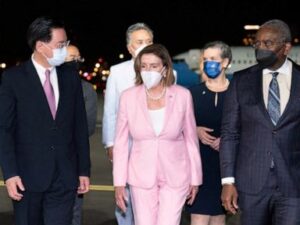
On August 3rd, Pelosi met Taiwanese President Tsai Ing-wen. In this meeting, Tsai thanked Pelosi for her support of democratic values and emphasized her commitment to working with the US in maintaining security in the Taiwan straits. Also, Pelosi praised Taiwan as “one of the freest societies in the world”.
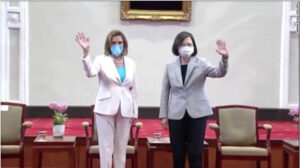
Pelosi was awarded the nation’s highest civilian award during her meeting with Tsai. The award was the Order of the Propitious Cloud, which represents auspiciousness and friendship. This esteemed honor is highly symbolic for Tsai to cement the relationship between the US and Taiwan, and project strength in standing against Chinese aggression.
CHINA’S RESPONSE
Currently, China considers independent Taiwan as a province, a chunk of territory that will be seized in the future, and regards Pelosi’s visit as a major provocation. Chinese foreign ministry spokesman Zhao Lijian constantly warned Pelosi of “serious developments and consequences” if a Taiwan visit occurred.
On August 2nd, the Chinese PLA Eastern Command announced the execution of several military exercises surrounding Taiwan. These exercises will occur from August 4th to the 7th. The main intentions for these drills are not entirely clear. Lately, CCTV reported a substantial number of speedboats from a PLA Navy brigade. Also, various units of the PLA engaged and concentrated in air and missile defense, anti-reconnaissance, sea strikes, and damage control.
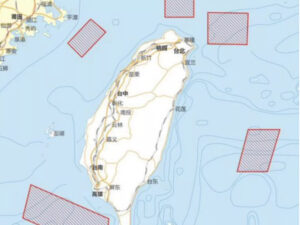
Following the announcement, the Chinese PLA posted a propaganda video of the mobilization of its army, navy, and air forces. In the video, according to the New York Post, the PLA soldiers stated that they will “fight upon order, bury every intruder, and move toward joint and successful operations!”. They also said that they “swear to defend the motherland to the death.”
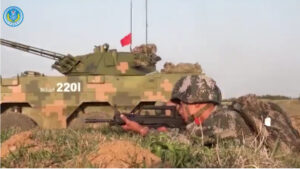
In retaliation to Pelosi’s visit, China blocked imports of citrus and fish from Taiwan. On August 3rd, China’s Ministry of Commerce suspended natural sand exports to Taiwan. On the same day, the Chinese PLA Air Force sent dozens of planes into the island’s air identification zone.
After a series of Chinese threats, John Kirby – Coordinator for Strategic Communications at the National Security Council – told reporters that “we shouldn’t be intimidated by that rhetoric or those potential actions.”
SEVERING AGREEMENTS?
After deploying 13 warships and 68 military aircraft towards the Taiwan Strait, China promised a full retaliation due to recent Speaker Pelosi’s Taipei visit.
On August 4th, China canceled or suspended several countermeasures with the US. These countermeasures include the Maritime Consultative Agreement (MMCA). The MMCA was signed between the US Department of Defense and the PRC Ministry of National Defense. The objective of the MMCA is to regulate the maritime activities of the two militaries, promote safe practices, and establish communication procedures when ships and aircraft encounter each other.
In addition, China suspended Sino-American cooperation on repatriation of illegal immigrants, criminal matters, counter narcotics, and climate change.
BUSINESS-AS USUAL IN TAIWAN
Despite Speaker Pelosi’s Taiwan visit being 24 hours, the small democratic island became one of the most frequently discussed topics. However, life in Taiwan remained calm and normal. While international discussion centered on the risks of escalated military conflict between the US and China, local Taiwanese news largely focuses on issues in the country. Despite numerous stern warnings from China, the Taiwanese people have grown accustomed to that kind of rhetoric. Furthermore, Taiwan’s military measures Chinese military threats and conducts routine defensive exercises on almost a daily basis.
US MILITARY MOBILIZES
A few weeks ago, the US Navy deployed aircraft carrier USS Ronald Reagan (CVN-76) and big deck amphibious ship USS Tripoli (LHA-7) to the South China Sea. In addition, these ships carry advanced Navy fighters and Marine F-35B Lightning II Joint Strike Fighters. This indicates that the US is planning to conduct more military exercises with its many Asian states.
For instance, the US and Indonesian militaries are hosting the Super Garuda Shield exercises along with Australia, Japan, and Singapore. In addition, the UK, France, and half a dozen other countries intend to participate in or observe Super Garuda Shield. This exercise will comprise 5000+ soldiers participating in land, sea, air, and marine drills. The US Embassy in Jakarta states that the “exercises are designed to strengthen interoperability, capability, trust, and cooperation in support of a free and open Indo-Pacific.”
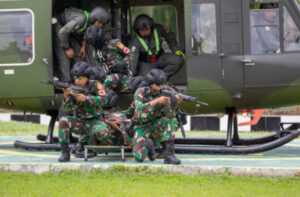
OTHER NATIONS ON US-CHINA TENSIONS
After weeks of increasing Chinese military aggression around Taiwan, many nations bluntly supported and criticized Chinese President Xi’s actions.
On August 2nd, Russia announced its support for China’s position regarding Speaker Pelosi’s visit to Taiwan. Maria Zakharova, Russia’s foreign ministry spokeswoman, declared that the expected visit was America’s provocative attempt to beset China. Later, Zakharova confirms Russia’s support for the one-China policy and opposition to Taiwanese independence.
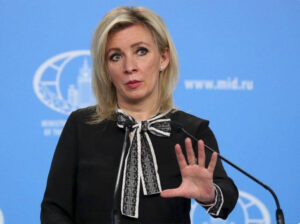
However, several Southeast Asian nations called for a peaceful resolution between the US and China. For instance, Indonesian officials warned of “open conflict and disruption of peace and stability.”
The G7 (Canada, France, Germany, Italy, Japan, UK, US, & European Union) released a joint statement condemning China for “destabilizing” the Taiwan Strait over Pelosi’s visit. In addition, the G7 foreign ministers declared that “there is no justification to use a visit as pretext for aggressive military activity in the Taiwan Strait.”
THE FUTURE
For seven decades, the US and China possessed contrasting views regarding Taiwanese sovereignty. Throughout a series of conflicts, China increased its exertion of force over Taiwan through military drills and bombardments of islands. In response, the US tries to uphold its support in the one-China policy and recognition of the People’s Republic of China (PRC), but past American presidents and policymakers continue to support Taiwan’s military in any way possible. Since New Gingrich’s 1997 trip, the US and China’s economic interdependence and trade relations have substantially increased. However, US-China relations until recent Chinese military exercises in the and nearly exploded during Speaker Pelosi’s trip.
Currently, a far more dangerous era for Cross-Straits relations is looming. Xi Jinping promised to achieve China’s “great rejuvenation” by 2049 (the 100th Anniversary of the CCP’s victory in the Chinese Civil War). This “great rejuvenation” is the complete unification with Taiwan. Specifically, Xi is committed to relaying the idea of Taiwanese unification from generation to generation. In response, the United States has taken several actions in assisting Taiwan. These actions include reforming the Taiwanese reserve forces and increasing Taiwanese capabilities of self-defense (e.g. missiles, sea mines).
Pelosi’s trip has drawn sharp criticism from many Chinese officials, most of whom threatened to engage the US military if necessary. Overall, Pelosi’s visit has hauled US-China relations to an all-time low. In the future, military experts indicated that China could attempt naval blockades to impede American access to Taiwan, including access to the island’s semiconductor industry.
In conclusion, US-China tensions remain high as both nations attempt to avert a “Fourth Taiwan Strait Crisis.” At a conference discussing rising global conflicts, UN Secretary-General Antonio Guterres concludes that “humanity is just one misunderstanding, one miscalculation away from nuclear annihilation.”


